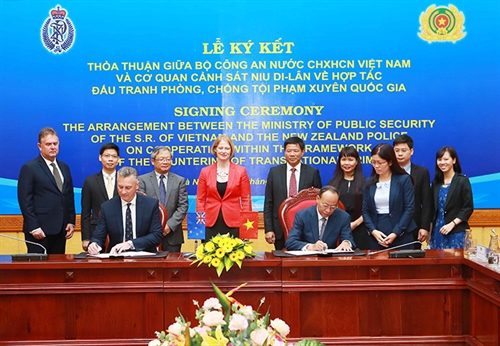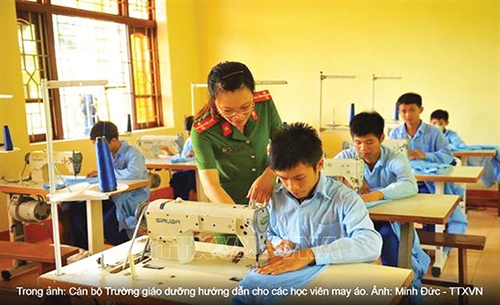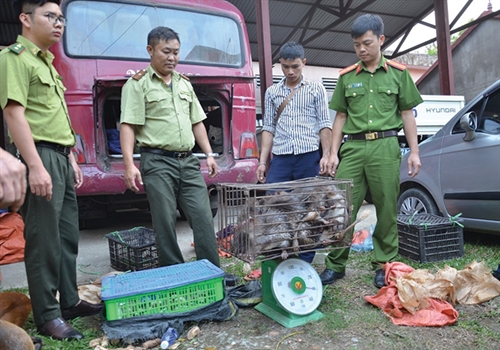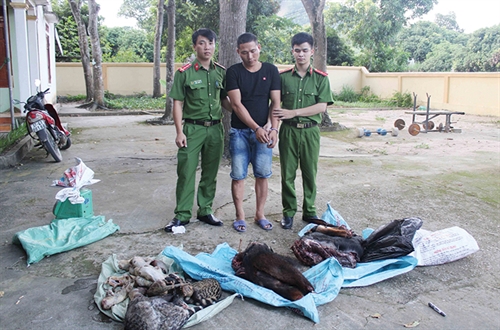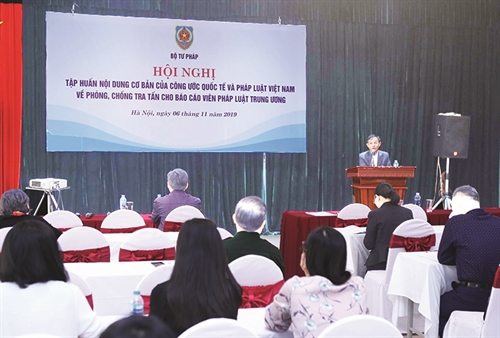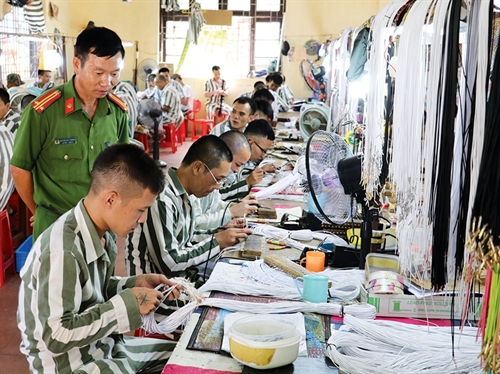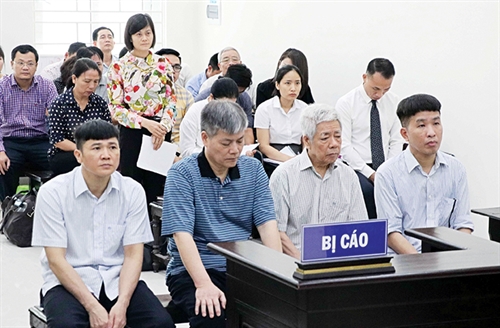Le Huynh Tan Duy[1] and Tran Thi Ha[2]
Exit postponement as a preventive measure
As defined in the 2015 Criminal Procedure Code (the Code)[3], exit postponement is a deterrent measure in criminal procedure that may be imposed on persons against whom denunciations or criminal case initiation proposals are made, the accused or defendants when there are sufficient valid grounds (to believe that they have committed an offense) in order to prevent them from leaving the country for a given period of time while their criminal case initiation, investigation, prosecution or trial are carried out.
 |
| Legal experts discuss coercive measures in criminal proceeding at a conference __Photo: Internet |
Characteristics of exit postponement
Firstly, exit postponement is provided in the Code as a new deterrent measure of coercive nature which is selectively applied by competent persons to a wide range of persons, whether or not criminally charged, according to law-provided procedures.
Secondly, the legal consequence of this measure is suspension of the exit of targeted persons, depriving them of the right to free movement[4] for a definite time. Persons against whom this measure is applied may only travel within the Vietnamese territory and cannot leave the country for a given period of time. Exit postponement greatly affects the work, study and daily life of targeted persons, particularly foreigners since they cannot return to their homes.
Thirdly, exit postponement in different legal domains, such as criminal procedure, civil procedure, criminal judgment execution, civil judgment execution, and sanctioning of administrative violations, is subject to different grounds, subjects of imposition, imposing competence, time limits, etc.
As a deterrent measure, once imposed early (for example, right from the stage of processing crime information) and through the stages of criminal case initiation, investigation, prosecution and trial, exit postponement helps ensure the settlement of criminal cases by preventing targeted persons from absconding from the country and helping competent persons effectively conduct criminal proceedings, especially those that require the presence of such persons such as taking of testimonies, interrogation, confrontation and face recognition, in order to collect necessary evidence.
Grounds for provision on and imposition of exit postponement
Regarding legal grounds, it is provided in the 2013 Constitution that “citizens have the right to free movement and residence within the country, and the right to leave the country and to return home from abroad”[5]. This is one of the basic human rights of citizens that must be respected, protected and guaranteed. Article 14.2 of the Constitution also emphasizes: “Human rights and citizens’ rights may not be limited unless prescribed by a law solely in case of necessity for reasons of national defense, national security, social order and safety, social morality and community well-being.” This constitutional provision is the basis for the Code to provide deterrent and coercive measures, including exit postponement.
However, once being suspected of having committed crimes, targeted persons may have their human rights and citizens’ rights limited so as to facilitate the collection of crime-proving evidences, thereby contributing to quickly settling criminal cases, protecting the legal order, restoring and protecting lawful rights and interests of other individuals, agencies and organizations. These constitute the mission of the Code[6].
Foreigners who are staying in Vietnam may also be suspended from exit if there are sufficient law-provided grounds. This relates to the spatial effect of the Code, which stipulates: “the Criminal Procedure Code is effective on all criminal proceedings in the territory of the Socialist Republic of Vietnam”[7]. Criminal proceedings against foreigners who commit offenses in the territory of Vietnam will be conducted in accordance with treaties to which Vietnam is a contracting party or on the principle of reciprocity[8].
From practical perspectives, exit postponement has been long required by the reality to be provided by the criminal procedure law as a deterrent measure to stop criminally denounced or charged persons from absconding. However, since the 2003 Criminal Procedure Code did not yet provide exit postponement, criminal proceeding-conducting bodies had to apply other relevant legal documents to this effect[9]. However, since these legal documents cover not only the measure of exit postponement but also many others related to entry, transit and residence of foreigners in Vietnam and many different fields (civil procedure, civil judgment execution and criminal judgment execution), they fail to fully reflect the particularities and nature of the measure of exit postponement and all issues related to its application in criminal procedure. For example, as per the 2014 Law on Entry, Exit, Transit and Residence of Foreigners in Vietnam, a foreigner may have his/her exit postponed if he/she is the accused or a defendant or a person with related rights and obligations in a criminal case. The problem is that “a person with related rights and obligations in a criminal case” is not yet clearly defined in the criminal procedure law and the Law on Entry, Exit, Transit and Residence of Foreigners in Vietnam[10]. This could lead to an improper interpretation by competent bodies, which might infringe upon the citizens’ right to free movement.
Similarly, Government Decree 136/2007/ND-CP dated August 17, 2007, on entry and exit of Vietnamese citizens, provides that “Vietnamese citizens may not leave the country if they are being examined for penal liability or related to criminal investigation”. This decree again fails to give a clear definition of a person related to criminal investigation and providing grounds. This could result in an excessive discretion of competent bodies in the practical application of this provision. That’s why the Code adds provisions on exit postponement to unify the application of this preventive measure.
Criminal law provisions on exit postponement
Grounds and subjects
Targeted persons may not be allowed to leave the country when there are grounds to believe that their exit “shows signs of abscondence”[11]. However, specific grounds based on which competent bodies may deem that these persons intend to abscond are not provided in any legal documents on criminal procedure. As construed by some legal experts, the Code implies that investigation bodies should know or be reported that these persons are prepared to leave the country before assessing whether or not they want to abscond. In reality nobody who intends to leave the country would report such to investigation bodies. This puts investigation bodies in a dilemma that they may be held responsible for these persons’ absconding even when they could not issue decisions to stop their exit for having no grounds to believe that their exit “shows signs of abscondence”.
On principle, exit postponement may be imposed independently as a preventive measure. However, as many legal experts suggest, it is necessary to impose this measure in combination with others, such as ban on travel outside one’s residence, depositing of money as security, and bail, especially in border localities. Until now, the criminal procedure law remains silent on whether it is possible to impose more than one deterrent measure on a single person at the same time.
Regarding the postponement of the exit of persons not yet criminally charged and prosecuted, the Code states that this measure may be imposed if there are sufficient grounds acquired through examination or verification to suspect that they would have committed offenses and it is deemed necessary to immediately prevent them from absconding or destroying evidence[12]. Whereas, exit postponement may be imposed on criminally charged persons (the accused and defendants) whenever there are grounds to believe that they intend to abscond. Compared to other preventive measures, exit postponement has a wider scope of imposition although general provisions on deterrent measures in Article 109 of the Code[13] do not state that persons against whom denunciations or criminal case initiation proposals are made may be subject to exit postponement.
In addition, persons eligible for postponement or suspension of serving of their imprisonment sentences, early conditional release or suspended sentence during their probation periods, and persons serving non-custodial penalties during their serving periods under the 2019 Law on Execution of Criminal Judgments may face exit postponement[14].
Imposition competence and procedures
Like the measures of bail and depositing of money as security, two groups of persons may impose exit postponement:
Group 1 consists of persons who may issue warrants or decisions for arrest of the accused or defendants for temporary detention: (i) heads and deputy heads of investigation bodies at all levels; (ii) chief procurators and deputy chief procurators of people’s procuracies and military procuracies at all levels; (iii) chief justices and deputy chief justices of people’s courts and military courts at all levels; and trial panels. Their exit postponement decisions must be promptly notified to same-level procuracies in order to be executed. Notably, approval of same-level procuracies is not required for exit postponement as for bail and depositing of money as security.
Group 2 includes judges presiding over court hearings.
In addition to investigation bodies, certain bodies are assigned to carry out a number of investigation activities, such as the Immigration Department of the Ministry of Public Security and immigration offices of provincial-level Public Security Divisions. In the course of processing offense denunciations, reported criminal information and criminal case initiation proposals, these bodies can obtain sufficient grounds to believe that the exit of targeted persons shows signs of abscondence but they may not decide to postpone their exit and have to report it to investigation bodies for decision. This has somehow complicated the settling procedures and affected these bodies’ initiative in promptly preventing the abscondence of criminals.
Procedures for coordinating the imposition of exit postponement are provided in the 2014 Law on Entry, Exit, Transit and Residence in Vietnam of Foreigners (Article 29.6) and the 2019 Law on Entry and Exit of Vietnamese Citizens (Article 39). Accordingly, persons competent to decide on exit postponement have to notify in writing the exit postponement to the immigration management office of the Ministry of Public Security and concurrently to the affected persons.
Exit postponement time limit
The exit postponement time limit must not exceed the time limit for processing criminal information, initiation, investigation, prosecution or trial of a criminal case specified in the Code. For a person sentenced to imprisonment, it must not exceed the period from the time his/her imprisonment sentence is pronounced to the time he/she starts serving it[15]. These provisions are similar to those on non-custodial measures like bail, depositing of money as security and ban on travel out of one’s residence. The only difference is that since exit postponement might be imposed right from the stage of processing criminal information, the exit postponement time limit must, on principle, not exceed this stage’s time limit[16].
In case the investigation or prosecution decision time limit is extended, the exit postponement time limit is jointly guided by the Supreme People’s Procuracy, Ministry of Public Security and Ministry of National Defense[17] as follows: (i) upon expiration of the time limit for postponement of the exit of the accused, the investigation body or procuracy may issue a new prosecution decision which is valid for the extended time limit for investigation or prosecution decision; (ii) if the exit postponement time limit under the investigation body’s decision has not yet expired and remains equal to or longer than the prosecution decision time limit specified in Article 240 of the Code and it is deemed necessary to maintain the measure, the procuracy may decide to continue using the investigation body’s decision; (iii) if the exit postponement time limit under the investigation body’s decision has not yet expired but is not long enough for completion of the prosecution procedure and it is deemed necessary to maintain the measure, within five days before the expiration of the exit postponement time limit the procuracy shall issue a new prosecution decision.
Cancellation or replacement
Like other deterrent measures, exit postponement may be cancelled or replaced in four cases: (i) a decision not to initiate a criminal case is issued; (ii) the investigation or criminal case is ceased; (iii) the investigation or case against the accused is ceased; (iv) the defendant is pronounced by the court to be innocent, exempt from penal liability or penalties, or sentenced to a suspended sentence, or given a warning, fine or non-custodial reform penalty[18].
In addition, this measure may be cancelled when it is no longer necessary (e.g., grounds for its imposition no longer exist) or may be replaced with another deterrent measure[19].
Regarding cancellation procedures, the 2019 Law on Entry and Exit of Vietnamese Citizens provides that when having sufficient grounds to cancel an exit postponement decision, a competent person may send the cancellation document to the Ministry of Public Security’s immigration management office and concurrently notify it to the affected person. For foreigners, the 2014 Law on Entry, Exit, Transit and Residence of Foreigners in Vietnam use the term “release of exit postponement”, which requires persons that have issued the exit postponement decision to issue a decision on release of exit postponement as soon as the postponement conditions are cleared, and send such decision to the concerned immigration management office and the affected person.
Recommendations to improve criminal law provisions
There should be documents specifically guiding the Code’s provisions on deterrent measures, including exit postponement, as they may seriously restrict human rights and basic citizens’ rights, particularly grounds, conditions and specific cases of imposition.
The following issues should be clarified:
Grounds for determining that the exit of targeted persons aims to abscond or destroy evidence.Imposition of exit postponement in combination with other deterrent measures. It is necessary to affirm that exit postponement may be imposed either independently or in combination with another deterrent measure in order to optimize their effect and prevent the accused and defendants from absconding or obstructing the settlement of criminal cases.Joint Circular 04/2018/TTLT should be revised toward specifying cases of exit postponement upon extension of the time limit for processing criminal reports in the stage of criminal case initiation or the time limit for decision on prosecution. It is necessary to clearly provide that the time limit for imposition of deterrent measures, including exit postponement, which is decided by the procuracy must expire when the court accepts the case file enclosed with the procuracy’s indictment upon completion of the criminal case initiation procedure instead of when the procuracy makes such indictment against the person whose exit is postponed.The Code should add persons against whom denunciations or criminal case initiation proposals are made in Article 109.1 (on grounds for and subjects of deterrent measures) in order to be consistent with Article 124.1, and vest heads and deputy heads of bodies assigned to carry out a number of investigation activities, which are competent to handle criminal information, with the power to impose the measure of exit postponement so as to facilitate the performance of their tasks, thereby helping prevent criminals from absconding.
Article 124 of the Code should be added with provisions on procedures for imposition of exit postponement, specifically as follows:
“Article 124. Exit postponement
…
4. A person issuing an exit postponement decision shall promptly send such decision to the immigration management office of the Ministry of Public Security. Upon receiving verifying information from the immigration management office of the Ministry of Public Security, the exit postponement decision issuer shall notify such in writing to the person whose exit is postponed, unless it is impossible to do so for a security reason or for keeping investigation secrets.”
The phrase “handling of criminal information” should be removed and a provision on the time limit for exit postponement in case of suspending the handling of criminal information should be added to Article 124 of the Code, specifically as follows:
“3. The time limit for exit postponement must not exceed the time limit for criminal case initiation, investigation, prosecution and trial specified in this Code. The time limit for postponement of the exit of a person sentenced to imprisonment must not exceed the period from the time his/her sentence is pronounced to the time he/she starts serving it.
In case the time limit for checking and verification of criminal reports or denunciations has expired under Article 147 of this Code but no expert examination or asset valuation results are obtained or responses to requests for provision of important documents and objects that are decisive to whether or not a criminal case is initiated are received, the time limit for exit postponement may be extended until expertise or asset valuation results are obtained or important documents and objects are provided.”
This revision aims to reaffirm that handling of criminal information does not constitute an independent procedural stage but is merely a step of the stage of criminal case initiation. This will raise the responsibility of proceeding-conducting bodies to better protect interests of affected persons. Relevant existing regulations on extension of the exit postponement time limit[20] should also be revised in conformity with the Code, especially those specifying cases subject to, competence to impose, and time limit for, exit postponement for foreigners[21], with necessary references to relevant provisions of the Code.-
[1] LL.D., Ho Chi Minh City University of Law. Email: lhtduy@hcmulaw.edu.vn[2] LL. M., Agribank, Northern Ho Chi Minh City branch. Email: tranha3061hs@gmail.com[3] Article 124 of the Code.[4] Provided in Article 23 of the 2013 Constitution.[5] Article 23 of the 2013 Constitution.[6] Article 2 of the Code.[7] Article 3.1 of the Code.[8] Article 3.2 of the Code.[9] Such as the Ministry of Public Security’s Circular 21/2011/TT-BCA on procedures for execution of decisions to delay permission for entry or exit or postpone exit; the 2014 Law on Entry, Exit, Transit and Residence of Foreigners in Vietnam; and the 2019 Law on Entry and Exit of Vietnamese Citizens.[10] Is he/she the one having related obligations (i.e., civil obligations in a criminal case) as specified in Article 54 of the 2003 Criminal Procedure Code, or a person against whom a denunciation or criminal case initiation proposal is made?[11] Article 124.1 of the Code.[12] Article 124.1.a of the Code[13] “In order to prevent offenses in time or when there are grounds to believe that criminally charged persons may cause difficulties to the investigation, prosecution or trial, or they may further commit offenses, or when it is necessary to secure the judgment execution, bodies and persons competent to conduct the proceedings may apply measures of…”[14] Article 36.2 of the 2019 Law on Entry and Exit of Vietnamese Citizens.[15] Article 124.3 of the Code.[16] Specified in Article 147 of the Code.[17] In Joint Circular 04/2018/TTLT-VKSNDTC-BCA-BQP dated October 19, 2018.[18] Article 125.1 of the Code.[19] Article 125.2 of the Code.[20] Article 29.5 of the 2014 Law and Article 37.11 of the 2019 Law on Entry and Exit of Vietnamese Citizens.[21] Articles 28.3 and 29.1 of the 2014 Law on Entry, Exit, Transit and Residence of Foreigners in Vietnam.
